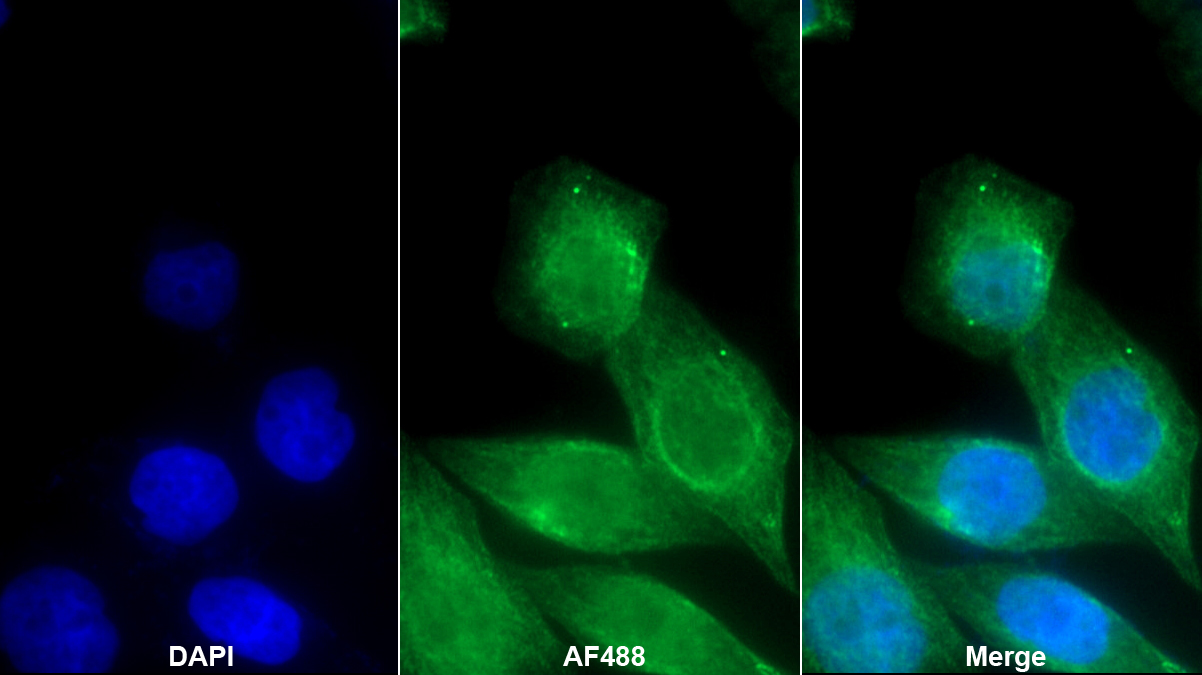Monoclonal Antibody to Acetylcholinesterase (ACHE)
ARAChE; N-AChE; YT
- Product No.MAB447Hu26
- Organism SpeciesHomo sapiens (Human) Same name, Different species.
- SourceMonoclonal antibody preparation
- HostMouse
- Potency (Clone Number)C12
- Ig Isotype IgG2bKappa
- PurificationProtein A + Protein G affinity chromatography
- LabelNone
- Immunogen RPB447Hu01-Recombinant Acetylcholinesterase (ACHE)
- Buffer FormulationPBS, pH7.4, containing 0.02% NaN3, 50% glycerol.
- TraitsLiquid
- Concentration1mg/mL
- Organism Species Moren/a
- ApplicationsICC/IF
If the antibody is used in flow cytometry, please check FCM antibodies. - Downloadn/a
- UOM 20µl100µl 200µl 1ml 10ml
- FOB
US$ 107
US$ 250
US$ 357
US$ 893
US$ 3570
For more details, please contact local distributors!
SPECIFITY
The antibody is a mouse monoclonal antibody raised against ACHE. It has been selected for its ability to recognize ACHE in immunohistochemical staining and western blotting.
USAGE
Immunofluorescence: 5-20µg/mL;
Optimal working dilutions must be determined by end user.
STORAGE
Store at 4°C for frequent use. Stored at -20°C in a manual defrost freezer for two year without detectable loss of activity. Avoid repeated freeze-thaw cycles.
STABILITY
The thermal stability is described by the loss rate. The loss rate was determined by accelerated thermal degradation test, that is, incubate the protein at 37°C for 48h, and no obvious degradation and precipitation were observed. The loss rate is less than 5% within the expiration date under appropriate storage condition.
GIVEAWAYS
INCREMENT SERVICES
-
 Antibody Labeling Customized Service
Antibody Labeling Customized Service
-
 Protein A/G Purification Column
Protein A/G Purification Column
-
 Staining Solution for Cells and Tissue
Staining Solution for Cells and Tissue
-
 Positive Control for Antibody
Positive Control for Antibody
-
 Tissue/Sections Customized Service
Tissue/Sections Customized Service
-
 Phosphorylated Antibody Customized Service
Phosphorylated Antibody Customized Service
-
 Western Blot (WB) Experiment Service
Western Blot (WB) Experiment Service
-
 Immunohistochemistry (IHC) Experiment Service
Immunohistochemistry (IHC) Experiment Service
-
 Immunocytochemistry (ICC) Experiment Service
Immunocytochemistry (ICC) Experiment Service
-
 Flow Cytometry (FCM) Experiment Service
Flow Cytometry (FCM) Experiment Service
-
 Immunoprecipitation (IP) Experiment Service
Immunoprecipitation (IP) Experiment Service
-
 Immunofluorescence (IF) Experiment Service
Immunofluorescence (IF) Experiment Service
-
 Buffer
Buffer
-
 DAB Chromogen Kit
DAB Chromogen Kit
-
 SABC Kit
SABC Kit
-
 Long-arm Biotin Labeling Kit
Long-arm Biotin Labeling Kit
-
 Real Time PCR Experimental Service
Real Time PCR Experimental Service
| Magazine | Citations |
| Acta Histochem Cytochem. | The Effects of Exercise-induced Fatigue on Acetylcholinesterase Expression and Activity at Rat Neuromuscular Junctions PubMed: PMC2775104 |
| Applied Biological Chemistry | Positive enhancement of Lactobacillus fermentum HY01 on intestinal movements of mice having constipation 10.1007/s13765-017-0327-3 |
| Molecular Nutrition & Food Research | Thymoquinone Can Improve Neuronal Survival and Promote Neurogenesis in Rat Hippocampal Neurons Pubmed:29277983 |
| Inflammation | Feishu Acupuncture Inhibits Acetylcholine Synthesis and Restores Muscarinic Acetylcholine Receptor M2 Expression in the Lung When Treating Allergic Asthma Pubmed:29520557 |
| International Journal of Molecular Sciences | In Vitro Evaluation and Docking Studies of 5-oxo-5H-furo [3, 2-g] chromene-6-carbaldehyde Derivatives as Potential Anti-Alzheimer's Agents Pubmed: 31683761 |
| BMC Anesthesiology | Cerebrospinal fluid cholinergic biomarkers are associated with postoperative delirium in elderly patients undergoing Total hip/knee replacement: a … Pubmed: 32988385 |
| PHYTOMEDICINE | Thymoquinone administration ameliorates Alzheimer's disease-like phenotype by promoting cell survival in the hippocampus of amyloid beta1-42 infused rat … Pubmed: 32920292 |
| PLoS One | Neuroprotective effect of sodium alginate against chromium-induced brain damage in rats Pubmed:35421180 |
| scientific reports | Neuropsychopharmacological profiling of scoparone in mice Pubmed:35039558 |
| SAUDI J BIOL SCI | Aqueous Ajwa dates seeds extract improves memory impairment in type-2 diabetes mellitus rats by reducing blood glucose levels and enhancing brain … Pubmed:35531250 |
| Saudi Pharmaceutical Journal | Sukkari dates seed improves type-2 diabetes mellitus-induced memory impairment by reducing blood glucose levels and enhancing brain cholinergic … Pubmed:35812141 |





